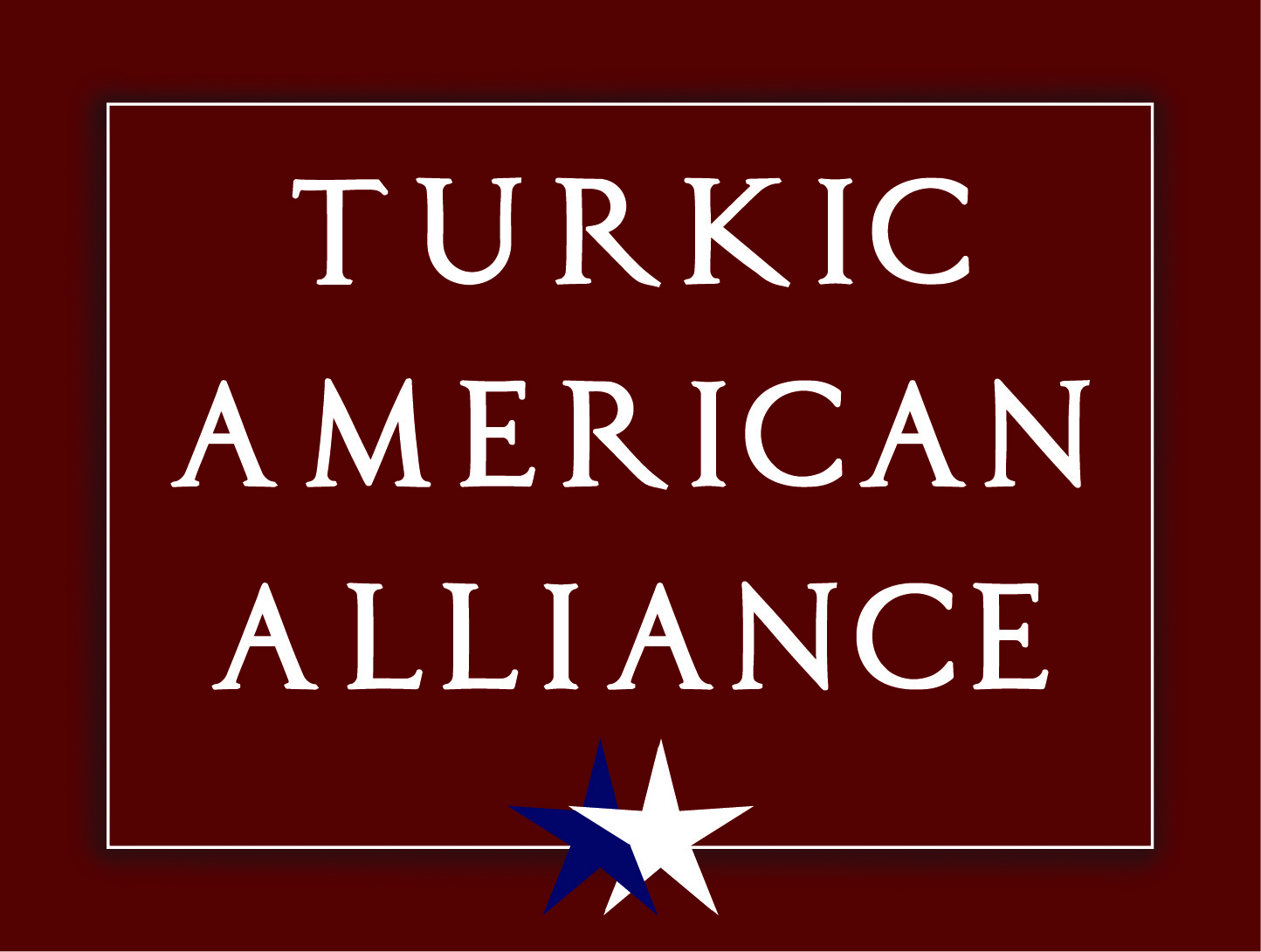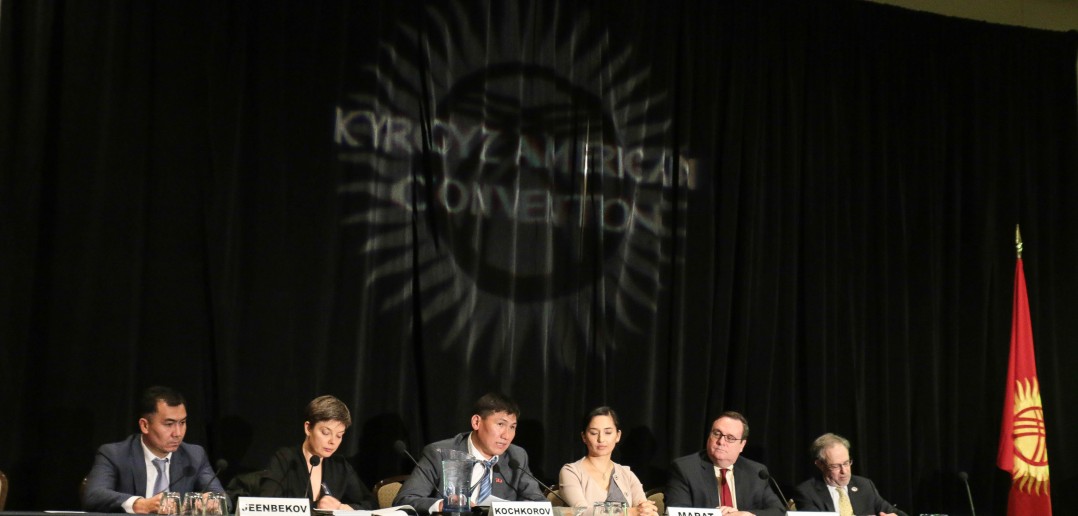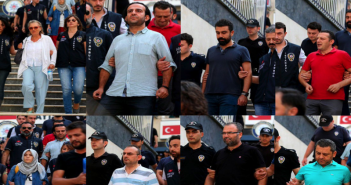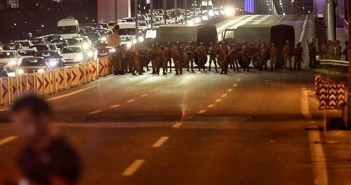The Forum Session of the First Annual Kyrgyz American Convention opened with Panel I, which addressed the topic of U.S.-Kyrgyz Relations. The Forum Session formed the academic and policy component of the Kyrgyz American Convention and was organized by the Rethink Institute, a nongovernmental and nonpartisan research institution located in Washington, D.C.
The moderator for Panel I was Erica Marat, a visiting scholar at the Kennan Institute of the Wilson Center who recently published “Two Decades of U.S.-Kyrgyz Relations” through the Rethink Institute.
The first panelist was the Honorable Ravshan Jeenbekov, Member of the Jogorku Kenesh (Supreme Council), the unicameral Parliament of the Kyrgyz Republic, of the Ata-Meken Party and Member of the Committee on Budget and Finance. MP Jeenbekov discussed the many successful changes and reforms implemented by the Kyrgyz Republic, while also acknowledging that it still has a long way to go. One such success, he went on, is the Kyrgyz American Convention itself, which serves as a framework through which both the ruling and opposition parties are able to represent their ideologies—a previously unthinkable feat. Other successes include a strong political opposition, which demonstrates strong democratic roots, political stability and a favorable investment climate, and countless parliamentarian reforms undertaken since 2010. In addition, MP Jeenbekov disagreed with the notion supported by many political scientists that an economy is the basis for politics. In a young country like Kyrgyzstan, MP Jeenbekov maintained, it is politics that define the economy. In other words, it is a society marked by political transparency, a strong political opposition and a pluralism of opinions that will build a strong and prosperous economy. As a result, according to the MP the Jogorku Kenesh is committed to furthering improvements and reforms to increase both economic prosperity and democratic values in the country. To close, MP Jeenbekov insisted that ongoing and future political reforms must lead to economic flourishing and prosperity in the Kyrgyz Republic.
The second panelist was the Honorable Ulukbek Kochkorov, Member of the Jogorku Kenesh of the Kyrgyz Republic of the Ata-Zhurt Party and Deputy Head of the Economic and Fiscal Policy Committee. MP Kochkorov discussed the investment climate in the Kyrgyz Republic. According to the MP, Kyrgyzstan must create an investment environment conducive to building a strong democratic environment within the country. The best way to guarantee that this happens, he maintained, is to ensure that the democratic and parliamentarian reforms and goals set in 2010 are implemented sooner rather than later in order to safeguard economic development in Kyrgyzstan.
MP Kochkorov also discussed the development of Kyrgyzstan’s parliamentarian system, the functions of the Jogorku Kenesh and the short learning curve that they required. The Jogorku Kenesh, or Supreme Council, is Kyrgyzstan’s nation-wide representative body. Its most important function is the implementation of supreme legislative authority as the direct presenter and expresser of the sovereignty, will and interests of the Kyrgyz people. Furthermore, unlike other regional and local representative authorities, the Parliament represents and expresses the will of the entire population of Kyrgyzstan. During its short history, the Kyrgyz Republic has already survived 7 constitutional amendments that have addressed issues relating to the structure of Parliament, the number of parliamentarians, the Parliament’s power scope and role, its election procedures and the number of committee members. Additionally, during this short time the Kyrgyz Parliament has experimented with a variety of parliamentary representational structures—bicameral, unicameral (which it is now), majority-based, majority-proportional and proportional (which it is now). In a seemingly permanent state of transformation, each new Parliament was forced to start from scratch with what MP Kochkorov called a “loss of institutional memory.”
Today, however, the Supreme Council’s role has radically changed. Since 2010, the Kyrgyz Republic has been operating within the framework of a parliamentary presidential republic. The Parliament no longer simply legalizes the authority of one person; it now serves the people and must be accountable to them. The Parliament must also work within a framework of division of power and within a political environment of political competition that includes factions, majority coalitions and the opposition. According to MP Kochkorov, what is additionally necessary is a new force of interrelationship among the presidential authority and other branches and local authorities through a synchronization of actions, without which the reforms the Kyrgyz Republic has painstakingly sought to enact will be doomed to failure. Indeed, said the MP, Kyrgyzstan is moving from street democracy to parliamentary democracy.
MP Kochkorov also described the new roles of the Jogorku Kenesh: strategic and socio-economic development initiatives and the implementation of regional and industrial programs—prerogatives which in the past belonged exclusively to the President of the Kyrgyz Republic. In terms of judicial reforms, the Parliament has the power to form judicial courts and councils to select judges. In terms of the development of civil society and mass media, the Parliament now works as an active partner to move reforms forward and to build a better society through improved communications. Lastly, the Parliament enacts increased accountability and transparency throughout the government.
Nonetheless, according to analyses of the first three years of activity of the current 5th Supreme Council, Parliament has yet to fully implement all of its constitutional powers. For instance, there is an incomplete integration of society into legislation and oversight processes; there is not yet any procedure to control adopted laws and decisions; the Parliament does not yet conduct assessments for the alignment of bi-laws to constitutional laws and adopted laws and does not have an accountability mechanism in this regard; the Parliament is still weak in interoperability between the coalition majority and the opposition minority; there are incomplete and low quality implementations of government actions due to the attachment of some executive branch members to factions that are part of the majority in the Parliament; and there is a lack of necessary interrelationship among the Parliament, the Presidential office and other government bodies. Given these shortcomings, and as a member of the financial and fiscal committee in particular, MP Kochkorov invited the U.S. and international community to fully participate in the development of laws beneficial to the continued investment and development of the Kyrgyz Republic.
The next panelist was Lesslie Viguerie, Director of the Office of Central Asian Affairs within the State Department. According to Mr. Viguerie, the United States and the Kyrgyz Republic have worked together since 2001 to build a secure and prosperous Afghanistan, during which time the Kyrgyz Republic contributed greatly to the Northern Distribution Network and through the establishment of the transit center at Manas International Airport. The transit center, however, is set to expire by July 2014, leading to a refocused effort to define the U.S. relationship with Kyrgyzstan and the broader region. The U.S. and Kyrgyzstan have also collaborated to combat drug trafficking throughout the region.
Mr. Viguerie also described the vision of the New Silk Road initiative to increasingly interconnect and grow the economic region of Eurasia. U.S. commitments to the region include partnerships of economic democratic development, mutual interests in the safety, stability and prosperity of the region, and increased economic opportunities and respect for the human rights of Kyrgyz citizens. Additionally, the U.S. has provided $2 billion in assistance to the Kyrgyz Republic since 1991. The future of Kyrgyz economic development hinges largely on the interest of foreign investors. Such foreign investment must be approached, however, through sustainable models of corporate and social responsibility to also benefit the Kyrgyz people. But even before such considerations are made, the Kyrgyz government must ensure the confidence of investors by increasing its rule of law and by enacting other political safeguards. It is also critical for the Kyrgyz Republic to diversify its trade.
In terms of democratic development, the Kyrgyz Republic has already seen peaceful presidential elections and transfers of executive power, as well as the formation of credible parliaments and of several peaceful coalition governments. Mr. Viguerie described the United States as proud to have supported Kyrgyzstan during these democratic advances and looks forward to further improvements towards a more inclusive democracy. Mr. Viguerie applauded the Kyrgyz Republic for maintaining the most open civil society and media in the region, as well as for its policies of ethnic recognition following events in the south in 2010.
Ambassador John O’Keefe, the former U.S. Ambassador to Kyrgyzstan and the current Executive Director of the Open World Leadership Center, was the final speaker for Panel I. Ambassador O’Keefe encouraged the United States and Kyrgyzstan to take a step back and to reevaluate and rebuild the future direction of their relationship. As the U.S. military presence in Afghanistan decreases and as the transit center at Manas closes next year, what will be the U.S. interests in Kyrgyzstan and in the broader region? Furthermore, what does Kyrgyzstan want from the United States? Ambassador O’Keefe offered a few suggestions that would be mutually beneficial to both nations: regional stability, economic development, increased human rights, increasing friends and allies in the region, Kyrgyzstan’s natural beauty and mineral resources, the university education hub in Bishkek, and the necessary upgrades required to make its international airport a trading hub. Finally, Ambassador O’Keefe applauded the Kyrgyz Republic for its past presidential election, a fair and democratic one that has set an important example for the rest of the region.
In the Q&A session, a few additional points were addressed:
- The U.S. is the only country that continues to support democratic development in Kyrgyzstan.
- There is a new opportunity for cooperation and engagement of small and mid-size international businesses in Kyrgyzstan.
- The Kyrgyz Republic is a small country; thus, it is unable to immediately offer large-scale economic development projects.
- Continued democratic development and an influx of American technologies in Kyrgyzstan will be the key to its development.
- Point of concern: over 1 million capable Kyrgyz workers are currently working in other countries.
- Suggestion: priority for economic development programs should not be given to program-based projects, but rather to investment-based projects.




